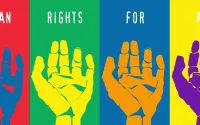 Images like this one in Niger mobilise donors, but often too late |
The UN special envoy to the Horn of Africa, Kjell Bondevik, says a disaster can be avoided if funding comes "in a matter of weeks... not months".
Around 11 million people are in serious danger in Kenya, Ethiopia, Eritrea, Somalia and Djibouti, the UN estimates.
The World Food Programme, leading the aid effort, says it has only a third of what it needs to close the shortfall.
Donors had committed just $186m (£106m) of the $574m (£327m) needed, the WFP says.
"I urge donors countries to pledge more and pay. Not only to pledge, but to pay," Mr Bondevik said on a tour to see first-hand the situation in Kenya.
Past disasters
It follows past food crises in Niger and other parts of Africa where, by the time images of dying children have prodded the international into action, it has been too late, says the BBC's Peter Greste in Nairobi.
Mr Bondevik said global climate change was the root cause for the failure of the past two rainy seasons, and it was incumbent on the global community to come to the aid of those at risk.
 |
"I'm afraid that we will go from a crisis to a disaster to a catastrophe if help is not provided in time," he said.
His comments were echoed by UK charity Oxfam, which said the response so far from rich donor countries had been "dwarfed by the immediate need".
The crisis is so bad in some parts of northern Kenya that families are being forced to eat insects, wild berries and squirrels to stay alive, Oxfam has found.
"Donors need to frontload their efforts so that action can be taken now; money given in three months will be too late for many," Paul Smith-Lomas, head of Oxfam in East Africa, said.






